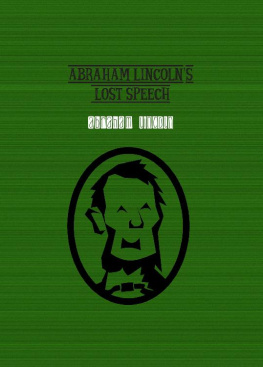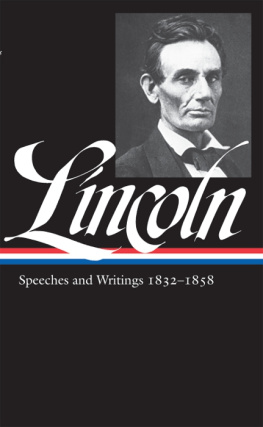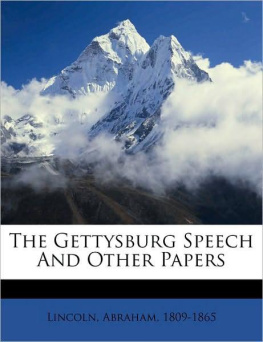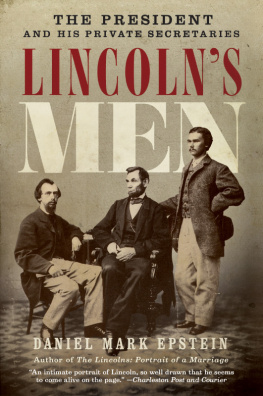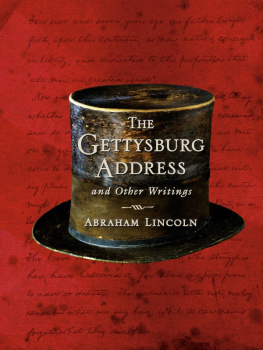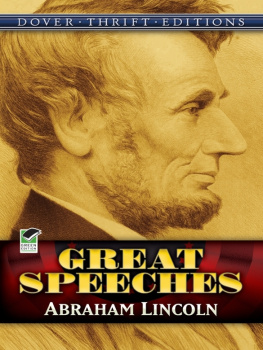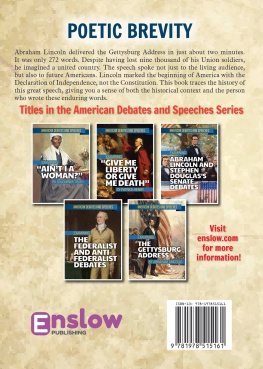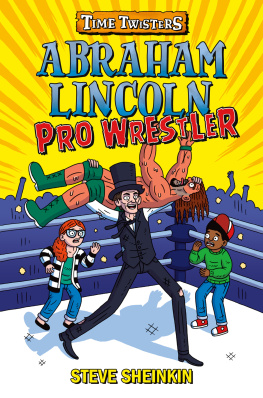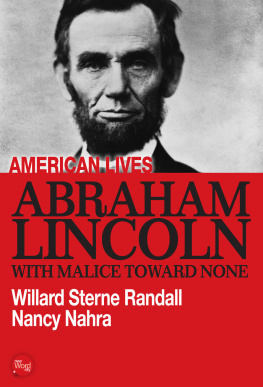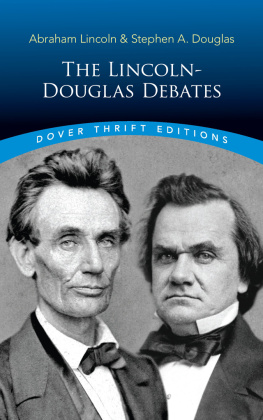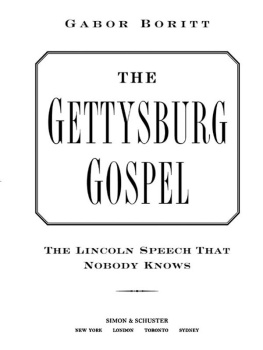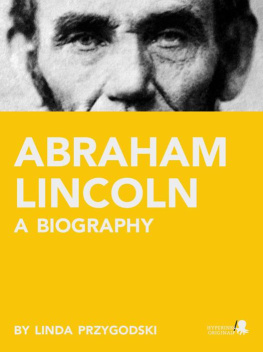ABRAHAM LINCOLN S
LOST SPEECH
Abraham Lincoln
TABLE OF CONTENTS
INTRODUCTION
The lost speech of Abraham Lincoln was delivered at the first Republican State Convention of Illinois, at Bloomington, on the 29th of May, 1856. The excitement caused among the audience by the speech was so great that the reporters forgot to take their notes, and for many years it was generally supposed that no record of the speech had been preserved. It appears, however, that Mr. H. C. Whitney, then a young lawyer of Illinois, did take notes of the speech, which he preserved; and after a lapse of forty years they were transcribed and were published in McClures Magazine for September, 1896, together with a letter from Mr. Joseph Medill, of the Chicago Tribune, who was present at the Convention and confirms the accuracy of Mr. Whitneys report.
By the kind consent of Mr. Whitney, and through the courtesy of Mr. S. S. McClure, the speech is now reproduced by the Republican Club of the City of New York as a souvenir of Lincoln for its Annual Dinner on the 12th of February, 1897.
LINCOLN S LOST SPEECH
R. CHAIRMAN AND GENTLEMEN: I was over at[Cries of Platform! Take the platform!] I say, that while I was at Danville Court, some of our friends of anti-Nebraska got together in Springfield and elected me as one delegate to represent old Sangamon with them in this convention, and I am here certainly as a sympathizer in this movement and by virtue of that meeting and selection. But we can hardly be called delegates strictly, inasmuch as, properly speaking, we represent nobody but ourselves. I think it altogether fair to say that we have no anti-Nebraska party in Sangamon, although there is a good deal of anti-Nebraska feeling there; but I say for myself, and I think I may speak also for my colleagues, that we who are here fully approve of the platform and of all that has been done [A voice: Yes!]; and even if we are not regularly delegates, it will be right for me to answer your call to speak. I suppose we truly stand for the public sentiment of Sangamon on the great question of the repeal, although we do not yet represent many numbers who have taken a distinct position on the question.
We are in a trying timeit ranges above mere partyand this movement to call a halt and turn our steps backward needs all the help and good counsels it can get; for unless popular opinion makes itself very strongly felt, and a change is made in our present course, blood will flow on account of Nebraska, and brothers hand will be raised against brother! [The last sentence was uttered in such an earnest, impressive, if not indeed tragic, manner as to make a cold chill creep over me. Others gave a similar experience.]
I have listened with great interest to the earnest appeal made to Illinois men by the gentleman from Lawrence [James S. Emery] who has just addressed us so eloquently and forcibly. I was deeply moved by his statement of the wrongs done to free-State men out there. I think it just to say that all true men North should sympathize with them, and ought to be willing to do any possible and needful thing to right their wrongs. But we must not promise what we ought not, lest we be called on to perform what we cannot; we must be calm and moderate, and consider the whole difficulty, and determine what is possible and just. We must not be led by excitement and passion to do that which our sober judgments would not approve in our cooler moments. We have higher aims; we will have more serious business than to dally with temporary measures.
We are here to stand firmly for a principleto stand firmly for a right. We know that great political and moral wrongs are done, and outrages committed, and we denounce those wrongs and outrages, although we cannot, at present, do much more. But we desire to reach out beyond those personal outrages and establish a rule that will apply to all, and so prevent any future outrages.
We have seen to-day that every shade of popular opinion is represented here, with Freedom, or rather Free-Soil, as the basis. We have come together as in some sort representatives of popular opinion against the extension of slavery into territory now free in fact as well as by law, and the pledged word of the statesmen of the nation who are now no more. We comewe are here assembled togetherto protest as well as we can against a great wrong, and to take measures, as well as we now can, to make that wrong right; to place the nation, as far as it may be possible now, as it was before the repeal of the Missouri Compromise; and the plain way to do this is to restore the Compromise, and to demand and determine that Kansas shall be free! [Immense applause.] While we affirm, and reaffirm, if necessary, our devotion to the principles of the Declaration of Independence, let our practical work here be limited to the above. We know that there is not a perfect agreement of sentiment here on the public questions which might be rightfully considered in this convention, and that the indignation which we all must feel cannot be helped; but all of us must give up something for the good of the cause. There is one desire which is uppermost in the mind, one wish common to us allto which no dissent will be made; and I counsel you earnestly to bury all resentment, to sink all personal feeling, make all things work to a common purpose in which we are united and agreed about, and which all present will agree is absolutely necessarywhich must be done by any rightful mode if there be such: Slavery must be kept out of Kansas! [Applause.] The testthe pinchis right there. If we lose Kansas to freedom, an example will be set which will prove fatal to freedom in the end. We, therefore, in the language of the Bible, must lay the axe to the root of the tree. Temporizing will not do longer; now is the time for decisionfor firm, persistent, resolute action. [Applause.]
The Nebraska bill, or rather Nebraska law, is not one of wholesome legislation, but was and is an act of legislative usurpation, whose result, if not indeed intention, is to make slavery national; and unless headed off in some effective way, we are in a fair way to see this land of boasted freedom converted into a land of slavery in fact. [Sensation.] Just open your two eyes, and see if this be not so. I need do no more than state, to command universal approval, that almost the entire North, as well as a large following in the border States, is radically opposed to the planting of slavery in free territory. Probably in a popular vote throughout the nation nine-tenths of the voters in the free States, and at least one-half in the border States, if they could express their sentiments freely, would vote NO on such an issue; and it is safe to say that two-thirds of the votes of the entire nation would be opposed to it. And yet, in spite of this overbalancing of sentiment in this free country, we are in a fair way to see Kansas present itself for admission as a slave State. Indeed, it is a felony, by the local law of Kansas, to deny that slavery exists there even now. By every principle of law, a negro in Kansas is free; yet the bogus legislature makes it an infamous crime to tell him that he is free![1]
The party lash and the fear of ridicule will overawe justice and liberty; for it is a singular fact, but none the less a fact, and well known by the most common experience, that men will do things under the terror of the party lash that they would not on any account or for any consideration do otherwise; while men who will march up to the mouth of a loaded cannon without shrinking will run from the terrible name of Abolitionist, even when pronounced by a worthless creature whom they, with good reason, despise. For instanceto press this point a littleJudge Douglas introduced his anti-Nebraska bill in January; and we had an extra session of our legislature in the succeeding February, in which were seventy-five Democrats; and at a party caucus, fully attended, there were just three votes, out of the whole seventy-five, for the measure. But in a few days orders came on from Washington, commanding them to approve the measure; the party lash was applied, and it was brought up again in caucus, and passed by a large majority. The masses were against it, but party necessity carried it; and it was passed through the lower house of Congress against the will of the people, for the same reason. Here is where the greatest danger liesthat, while we profess to be a government of law and reason, law will give way to violence on demand of this awful and crushing power. Like the great JuggernautI think that is the namethe great idol, it crushes everything that comes in its way, and makes aor as I read once, in a black-letter law book, a slave is a human being who is legally not a person but a thing. And if the safeguards to liberty are broken down, as is now attempted, when they have made things of all the free negroes, how long, think you, before they will begin to make things of poor white men? [Applause.] Be not deceived. Revolutions do not go backward. The founder of the Democratic party declared that all men were created equal. His successor in the leadership has written the word white before men, making it read all white men are created equal. Pray, will or may not the Know-nothings, if they should get in power, add the word protestant, making it read all protestant white men?
Next page
